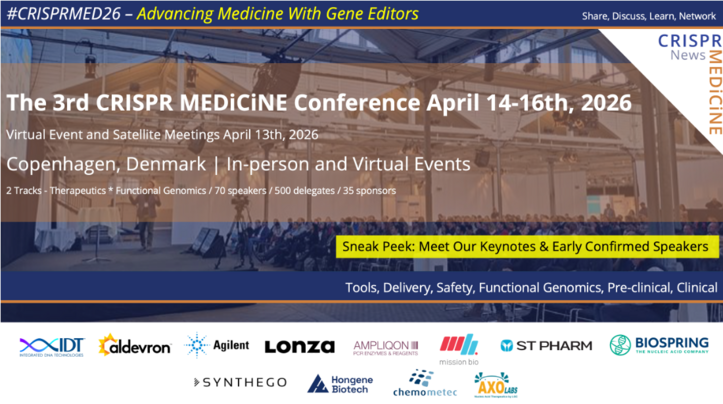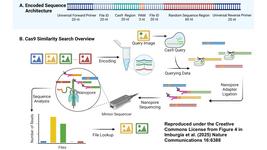First Patient Dosed in CRISPR Trial for Acute Myleoid Leukaemia
The first patient has been dosed in Intellia Therapeutics' Phase 1/2a clinical trial for AML, according to a recent press release. The investigational treatment, NTLA-5001, is Intellia’s first ex vivo CRISPR therapy candidate for cancer to approach the clinic.
NTLA-5001 targets Wilm’s tumour antigen
NTLA-5001 is developed using patient-derived T cells and is designed to target the Wilm’s tumour (WT1) antigen. WT1 is an intracellular protein that is over-expressed in AML and many other tumour types, and it has become an attractive target for immunotherapy-based approaches to cancer treatment. AML is the most common type of acute leukaemia in adults, and without treatment it rapidly progresses to a fatal stage.
To generate NTLA-5001, T cells are isolated from an AML patient, and the T cell receptor (TCR) is replaced with a natural (i.e. from a healthy donor) high-avidity TCR with specificity for WT1. Complete removal of the endogenous TCR is ensured by CRISPR-Cas9-mediated replacement of the TRAC locus with the WT1 TCR, and subsequent site-specific knockout of the TRBC locus, which encodes the T cell receptor beta chains. For disruption of the TCR loci, SpCas9 and gRNAs are delivered to the cells via lipid nanoparticles. The WT1 TCR is delivered to cells via adeno-associated virus (AAV) transduction. More details about the clinical-scale production and characterisation of NTLA-5001 can be found here.
The NTLA-5001 trial
NTLA-5001 is being assessed in a Phase 1/2a, single dose multi-center study that will evaluate its safety, tolerability, cellular kinetics (CK), activity, and pharmacodynamics (PD) in participants with AML. The trial is anticipated to enrol 54 adults in various sites in the US and UK who have detectable disease following standard first-line therapy, who carry the human leukocyte antigen-A0201 (HLA-A*02:01) allele, and who satisfy other trial-specific criteria.
The trial will include up to three dosing cohorts each of patients with lower disease burden and higher disease burden, defined according to the number of AML blasts present in the bone marrow.
Prior to treatment with NTLA-5001, participants receive intravenous lymphodepleting chemotherapy consisting of cyclophosphamide and fludarabine. This decreases the number of patient T cells in order to make space for the NTLA-5001-T cells.
The expected study completion date is September 2025.
Potent tumor killing expected in all genetic subtypes of AML
The anti-WT1 TCR used in NTLA-5001 was identified through screening of healthy individuals as a TCR with high affinity for WT1. It specifically recognises a specific WT1 epitope that is presented broadly by AML blasts with the HLA-A*02:01 allele. AML blasts are immature white blood cells that don’t offer immune protection, and WT1 is overexpressed in more than 90 % of all blasts. The TCR-engineered T cells can activate both helper T cells and cytotoxic T cells resulting in killing of WT1-expressing tumour cells.
Low WT1 expression in healthy tissues minimises toxicity, and Intellia expects that this approach has the potential to treat all mutational subtypes of AML. The TCR T-cell product is further subjected to undisclosed CRISPR-Cas9 genome edits to improve cell health, safety and function, and engineered cells are finally expanded to dosable numbers. Pre-clinical data unveiled at the 62nd American Society of Hematology (ASH) Annual Meeting in 2020 revealed robust anti-tumour responses for NTLA-5001 against patient-derived AML blasts that were transplanted into mice.
We strive to bring you all the clinical updates for gene-edited therapies. For a complete overview of current gene-editing clinical therapeutic trials as well as diagnostic trials, check out CRISPR Medicine News' Clinical Trials Database.
To get more of the CRISPR Medicine News delivered to your inbox, sign up to the free weekly CMN Newsletter here.
Tags
ArticleNewsClinical News Updatesin vivoLipid-based nanoparticleViralAdeno-associated virus (AAV)Acute Myeloid Leukemia, AMLCancerCancerCRISPR-CasCas9Intellia Therapeutics, Inc.
CLINICAL TRIALS
Sponsors:
Suzhou Maximum Bio-tech Co., Ltd.
Sponsors:
Zhejiang University







